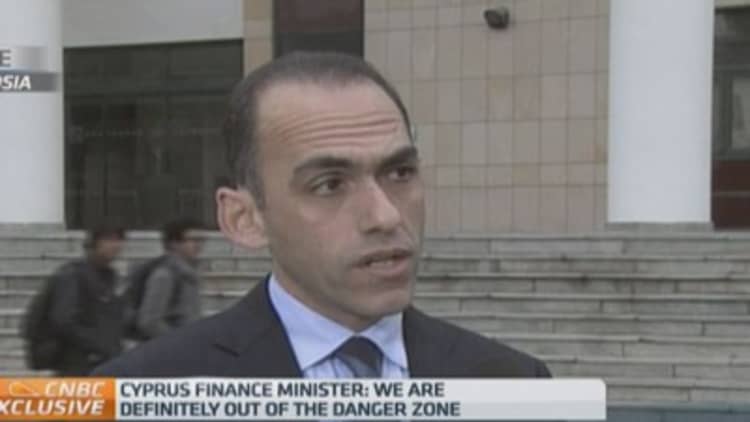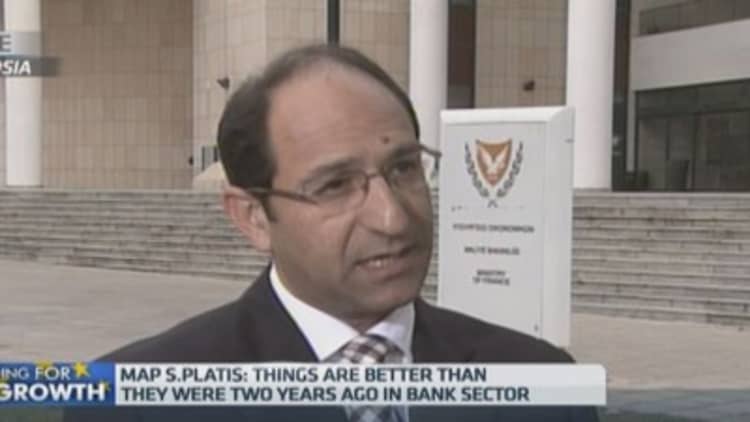
After a very public collapse of its financial sector in 2013, Cyprus' banking system is on the mend, the country's finance minister told CNBC, while insisting that the upcoming elections in Greece would not affect its economic recovery.
"We're in a much better situation," Minister of Finance Harris Georgiades told CNBC Monday. "We are definitely out of the danger zone now, and the recession seems to have run its course. We are very optimistic that the new year will see a return to positive growth rates."
Cyprus has been battling an economic slump compounded by the collapse of its financial system two years ago, which saw the country secure a 10 billion euro ($11.8 billion) bailout overseen by the so-called troika – made up of the European Commission, European Central Bank and International Monetary Fund.
But this was not before one of the country's financial behemoths, the Cyprus Popular Bank, was wound down and another – the Bank of Cyprus – was recapitalized by measures including the seizing of depositors' uninsured savings above 100,000 euros ($120,000).
'Not able to finance growth'
Now, after four years of recession, the country's central bank governor, expects growth of 0.5 percent in 2015. It is also preparing two international debt issues this year, Georgiades told Reuters last week, although the details are yet to be confirmed.
Speaking to CNBC in Nicosia, Cyprus' capital, Georgiades said the economy had stabilized after its "severe crisis."
"Cyprus was led into an unprecedented crisis, the public finances and banking system were in a severe crisis and the real economy in a deep recession. But the last two years were years of correction, of reform, of consolidation and we already have very tangible and very positive results," he said.

Looking ahead, Georgiades insisted that the country was determined to reform its economy.
"We are not only interested in mitigating the crisis but in creating the foundations for a much more viable, long-running economic model," he added.
Not everyone is convinced that the banking sector is fully recovered, however. Stelios Platis, managing director of financial services advisory firm MAP S.Platis, told CNBC that while things in Cyprus were much better than two years ago, the banking sector was, "not at the point where it is able to finance growth."
"But I think the conclusion is that the bail-in works better as a deterrent rather than as a remedy measure, especially for systemic banks. I think that's the lesson to be learnt from Cyprus," he said.
The Greek factor
Despite Georgiades' optimism, there are concerns about possible contagion from a key risk factor in the region: the upcoming general elections in Greece. Radical left-wing, anti-bailout party Syriza could win the vote, potentially undermining the austerity measures and reform policies implemented as a condition of Greece's international bailout, and such a possibility has weighed on European markets over recent weeks.
"Despite our close links to Greece we have a separate economy. The links of the past are not there anymore," he said, adding that the elections were not a problem for Cyprus,
Read MoreGreek stocks tank as snap election called
"We are implementing our own effort of reform and consolidation, we are seeing results, we have a stable economy nowadays and we are determined to grow. Even though, for the good of the Greek people, we hope that no problems will arise in Greece either."
The NPL problem
Another issue plaguing Cyprus is the high number of non-performing loans (NPLs), which the International Monetary Fund (IMF) said in October should be a "key priority" for the country.
The IMF said it needed to implement, "strong private-sector debt-restructuring framework, including legislation to facilitate foreclosures, complemented by a modernized insolvency regime."
According to the IMF, by July 2014, corporate NPLs stood at 50 percent and, "were highly concentrated, with construction NPLs now at over 73 percent and NPLs on primary-residence mortgages are around 40 percent."
Georgiades admitted that NPLs were a hangover from the country's "unsustainable credit expansion" in the past, but insisted the problem had "reached its peak" and that ongoing loan restructurings would see the number of NPLs decline.
- By CNBC's Holly Ellyatt, follow her on Twitter @HollyEllyatt. Follow us on Twitter: @CNBCWorld



